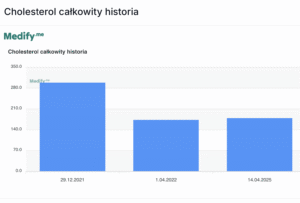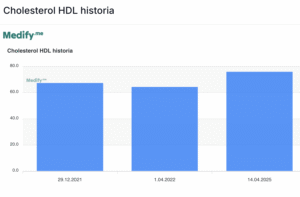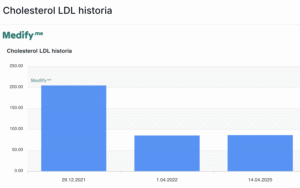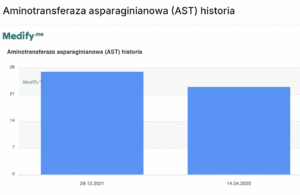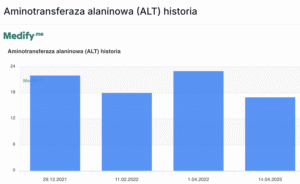Cholesterol and Statins: Facts, Myths, and Real-Life Results
In late 2021, I came face-to-face with an uncomfortable truth: my cholesterol levels were alarmingly high. My total cholesterol was over 280 mg/dL, and my LDL—the so-called “bad” cholesterol—was above 200 mg/dL. I knew that these numbers significantly increase the risk of atherosclerosis, heart attack, and stroke. My doctor suggested starting treatment with statins, specifically Rosuvastatin (Roswera 10 mg).
I won’t lie—I had my doubts. The internet is filled with articles and videos fueling a “statin phobia,” portraying these drugs as a necessary evil or even a “conspiracy” by the pharmaceutical industry. That’s why I decided to combine my personal story with hard data and an expert’s voice to debunk the most common myths.
What Exactly Is Cholesterol?
Cholesterol is a complex but fascinating organic molecule. We eat it, we produce it ourselves, we store it, and we excrete it. Crucially, without cholesterol, there is no life—it’s essential for building cells and producing hormones.
Most of the cholesterol we eat is not absorbed. The primary source of cholesterol in our body is the amount we produce ourselves (mainly in the liver). This is why diet, while important, is often not enough to significantly lower high blood cholesterol levels. Dietary cholesterol has a negligible impact on your blood cholesterol—this is a scientific fact, not an opinion.
My Results After Starting Statins
After just a few months of taking Rosuvastatin, the results were dramatic:
- Total Cholesterol: Dropped from ~285 to ~179 mg/dL
- LDL (“bad” cholesterol): Decreased from >200 to ~86 mg/dL
- HDL (“good” cholesterol): Remained at an excellent level, rising to nearly 76 mg/dL
After more than three years of therapy, my levels are stable and within the normal range. Most importantly: I have experienced no significant side effects—no muscle problems, no memory issues, and no liver complications.
An Expert’s View: Prof. Maciej Banach Debunks the Myths
My positive experience is not an isolated case. This is confirmed by one of the leading authorities in cardiology, Prof. Maciej Banach, MD, PhD. In an interview with the Polish portal Medonet.pl, the expert emphasizes that statins are “incredibly effective drugs” and are among the best-researched and best-tolerated medicines in the world.
Here’s how science and my own results dismantle the most common myths:
MYTH 1: “Statins destroy the liver.”
This is the most common fear among patients. But what do my results show? My liver enzymes (ALT and AST), tested regularly for over three years, have remained perfectly within the normal range:
- AST: 12/29/2021: 27 U/L -> 04/14/2025: 23 U/L
- ALT: 12/29/2021: 22 U/L -> 04/14/2025: 17 U/L
My data perfectly illustrates what Prof. Banach explains:
“There is no hard data to suggest that statins damage liver cells. (…) The only contraindication for using statins is acute liver disease.”
The professor adds that a temporary increase in liver enzymes at the beginning of therapy is a natural physiological reaction and returns to normal in over 90% of patients. My results are the best proof of this.
MYTH 2: “Statins cause dangerous side effects, especially muscle pain.”
Prof. Banach firmly states that there are only three confirmed side effects of statins:
- Muscle pain – Occurs in about 5-7% of patients and has specific characteristics (symmetrical, in large muscle groups). It is often related to the “nocebo effect” (ailments resulting from negative expectations).
- New cases of diabetes – This risk mainly concerns individuals with predispositions (prediabetes, obesity), and the benefit of reducing cardiovascular events is five times greater than this risk.
- A temporary increase in liver enzymes – as mentioned above.
As the professor highlights, a full 93-95% of patients take these drugs without any side effects. I am part of that group.
MYTH 3: “Diet and exercise are enough; statins are unnecessary.”
Diet and lifestyle are the absolute foundation, but they are not always sufficient. In my case, despite my efforts, only the combination with therapy brought the desired results. Prof. Banach warns against ignoring the problem:
“It shouldn’t be that a patient asks a doctor, ‘I have high LDL cholesterol. What should I do?’ and hears, ‘Just try a diet and don’t worry about it.'”
In Poland, about 70% of adults have cholesterol levels that are too high, leading to thousands of deaths each year. Statins genuinely save lives.
Why Was It Worth Starting the Treatment?
Thanks to statins, I didn’t just lower my cholesterol—I gained peace of mind. I am aware that my risk of cardiovascular disease has been genuinely reduced. The therapy has even become a motivation for an even healthier lifestyle.
Conclusion: Listen to Your Doctor, Not to Internet Myths
Not everyone needs to take statins, but the decision should be based on facts and a conversation with a doctor. As Prof. Banach says, patients have the right to be afraid, but it is the doctor’s role to explain the benefits and risks honestly. In my case, trusting evidence-based medicine was the best health decision I ever made.
Bonus: How to Effectively Monitor Your Treatment and Take Control of Your Health
As you can see, the key to my peace of mind and confidence that the therapy is safe was regularly tracking my results. I did this with the Medify.me app, which allows you to digitize and analyze your entire history of lab tests. Instead of sifting through stacks of paper, I have everything in one place, on clear charts.
Digital medical records mean:
📈 A complete picture of your health: Compare results and see trends over the years.
🧠 Smarter health decisions: See what’s working and what needs to change.
🕒 Saves time and stress: No more paper chaos or guessing where that last lab result is.
Thanks to regular analysis in Medify.me, I was confident that my treatment was not only effective but also safe. If you want to take full control of your medical data, I highly recommend it.
✉️ Try Medify.me and create your private digital health account: https://medify.me
Source for expert quotes: Article by Monika Mikołajska, “Polacy boją się tych leków jak ognia. Prof. Banach: są tylko trzy skutki uboczne statyn” (“Poles are terrified of these drugs. Prof. Banach: There are only three side effects of statins”), Medonet.pl, June 15, 2024.
